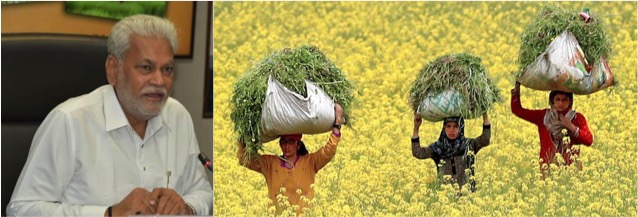The country is facing deficit of 23.4 per cent in dry fodder, according to the Union Ministry of Fisheries, Animal Husbandry and Dairying.
In a reply in the Lok Sabha on Tuesday, Parshottam Rupala said the ICAR — Indian Grassland and Fodder Research Institute (IGFRI), Jhansi, has estimated that there is deficit of 11.24 per cent, 23.4 per cent, and 28.9 per cent in green fodder, dry fodder and concentrates, respectively, in the country.
He attributed the shortage to the changing land use patterns, urbanisation, declining productivity of pastures, diversion of land towards commercial crops, and non-availability of quality fodder seed among others.
A meeting to review the fodder situation in the country was held on October 6 under the chairmanship of Secretary of the Department of Animal Husbandry and Dairying, with the State governments and the stakeholders, he said. Though the States informed the meeting there were no fears of any crisis, a hike in price was reported for fodder, which may reflect the general trend in inflation.
He said the government is implementing the National Livestock Mission with a sub-mission on feed and fodder development in the country. Under this, financial assistance is provided for seed production of high-yielding fodder varieties, promoting fodder crop as a cash crop and thereby diversifying more area under the fodder crops.
The fodder resource plans prepared for 20 States by the Jhansi-based IGFRI under the aegis of Indian Council of Agricultural Research (ICAR) have also been shared with the States for implementation, he said.
Crop insurance
Replying to a query on crop insurance in the country, Narendra Singh Tomar, Union Minister of Agriculture and Farmers Welfare, said the Pradhan Mantri Fasal Bima Yojana (PMFBY) was introduced in the country from kharif 2016 season.
He said 37.63 crore applications have been received under the scheme, and a total claims of ₹1,28,522.30 crore have been paid from 2016-17 to 2021-22.
On the complaints related to crop insurance, he said all the major works relating to the assessment of crop yield / crop loss for calculation of admissible claims are being performed by the State government or the Joint Committee of State government officials concerned and the insurance company concerned. In such a situation, insurance companies have a minimal role in loss assessment independently.
However, during the implementation of the PMFBY, some complaints against insurance companies about non-payment and delayed payment of claims; under payment of claims on account of incorrect / delayed submission of insurance proposals by banks; discrepancy in yield data and consequent disputes between State government and insurance companies; delay in providing State government share of funds, non-deployment of sufficient personnel by insurance companies etc., have been received in the past. Most of these complaints were suitably addressed by the State governments and the insurer concerned and the ministry, he said.
Mono cropping
To another query, he said farmers have not lost their heritage seeds of wheat and rice varieties once owned by their community forefathers due to mono-cropping of hybrids.
Traditional varieties have low yield potential, are tall and take more time to mature. This has restricted farmers from cultivating on large areas. However, maximum area of wheat and rice is under improved varieties, developed by using traditional seeds as parents.
He said the varieties of different crops, including traditional ones, have been conserved in the National Gene Bank at ICAR-National Bureau of Plant Genetic Resources in New Delhi.
Source : The Hindu Businessline 13th Dec 2022

